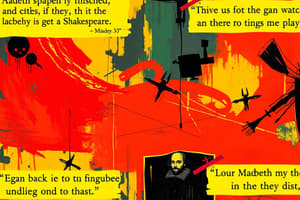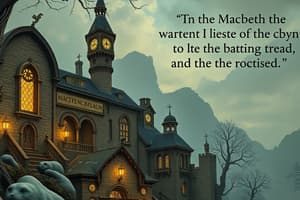Podcast
Questions and Answers
What is ambition?
What is ambition?
Ambition is striving to do something.
What does the quote 'All hail Macbeth, that shalt be king hereafter' signify?
What does the quote 'All hail Macbeth, that shalt be king hereafter' signify?
It gives Macbeth the ambition to become king.
What is the meaning of the phrase 'If chance will have me king, why chance may crown me without my stir'?
What is the meaning of the phrase 'If chance will have me king, why chance may crown me without my stir'?
It suggests that Macbeth is contemplating fate and his potential rise to power without having to take action.
What does Macbeth mean by 'Stars, hide your fires, let not light see my black and deep desires'?
What does Macbeth mean by 'Stars, hide your fires, let not light see my black and deep desires'?
What is the significance of Lady Macbeth's quote 'fill me / direst cruelty'?
What is the significance of Lady Macbeth's quote 'fill me / direst cruelty'?
What does Lady Macbeth mean by 'yet I do fear thy nature'?
What does Lady Macbeth mean by 'yet I do fear thy nature'?
What is meant by 'to be thus is nothing, but to be safely thus'?
What is meant by 'to be thus is nothing, but to be safely thus'?
What does Lady Macbeth mean when she says 'almost forgot the taste of fears'?
What does Lady Macbeth mean when she says 'almost forgot the taste of fears'?
What is Shakespeare's message about ambition?
What is Shakespeare's message about ambition?
Flashcards are hidden until you start studying
Study Notes
Ambition in Macbeth
- Ambition involves the drive to achieve goals, but unchecked ambition can result in negative consequences.
- Macbeth exemplifies an over-reacher whose ambition ultimately leads to his demise.
Key Quotes and Their Significance
-
Act 1 Scene 3: "All hail Macbeth, that shalt be king hereafter"
- This prophecy ignites Macbeth's ambition and desires for power, setting the plot into motion.
-
Act 1 Scene 3: "If chance will have me king, why chance may crown me without my stir"
- Reflects Macbeth's initial contemplation of fate versus action, illustrating his internal conflict regarding ambition.
-
Act 1 Scene 3: "Stars, hide your fires, let not light see my black and deep desires"
- A significant expression of Macbeth's hidden ambitions and dark intentions, showcasing his moral decline.
-
Act 1 Scene 5 - Lady Macbeth: "Fill me / direst cruelty"
- Lady Macbeth's ambition is equally potent, as she embraces ruthlessness to achieve power, pushing Macbeth towards regicide.
-
Act 1 Scene 5 - Macbeth's Doubts: "Yet I do fear thy nature"
- Lady Macbeth recognizes that Macbeth's inherent kindness may hinder their quest for power, highlighting the struggle between ambition and morality.
-
Act 3: "To be thus is nothing, but to be safely thus"
- Macbeth expresses his growing paranoia and fear of losing power, illustrating the corrupting nature of unchecked ambition.
-
Act 5 - Lady Macbeth: "Almost forgot the taste of fears"
- Reflects Lady Macbeth's mental deterioration, as the consequences of their ambition begin to haunt her.
Conclusion on Ambition
- Shakespeare presents ambition as a double-edged sword; it is not inherently negative, but when pursued excessively without moral restraint, it becomes a fatal flaw leading to ruin.
Studying That Suits You
Use AI to generate personalized quizzes and flashcards to suit your learning preferences.




